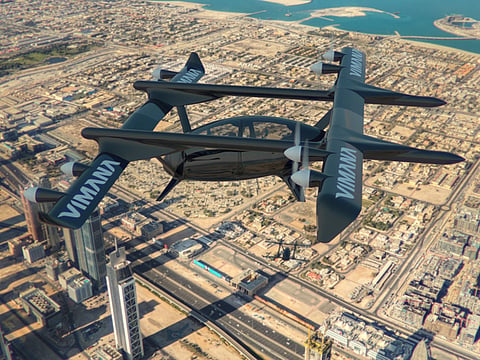Blockchain drone set for Dubai debut
Patent-pending technology responds to need for smart cities with tech-powered air traffic solution

A blockchain-powered drone will present an audacious version of how the UAE’s cities could manage traffic when it alights in Dubai next week. California-based Vimana Global will exhibit a prototype of its aerial autonomous passenger vehicle (AAV) at the Future Cities Show, being held from April 9 to 11 at the Dubai World Trade Centre.
The show, which brings together public, private, non-profit, and academic institutions in an attempt to find innovative solutions for the urban areas of the future, is in line with the emirate’s ambition to be one of the world's most connected and sustainable cities.
“The event will display, test, demonstrate and discuss future technology supporting all urban planners, architects, master-planners, engineers, scientists as well as consumers – to see the future unfolding in front of their eyes,” says Dawood Al Shezawi, Chairman of the show’s organising committee. The event runs alongside the Annual Investment Meeting.
While Vimana’s flying taxi prototype is expected to command attention, the company will use the event to introduce its blockchain airspace platform for managing AAV flight routes. The patent-pending system works by designating each AAV as a network node that validates the flight routes of all other nodes, bypassing a centralised flight direction authority. By putting the nodes in constant contact with each other, passengers should be able to merely pick their final destination and sit back as they are delivered to their stop.
The company, which expects to begin commercial operations by 2023, is one of several offering possible solutions for present and future traffic demands.
Several UAV projects have been showcased in the UAE recently. In November, Abu Dhabi Police announced a 600kg drone ambulance, while Dubai’s Roads and Transport Authority has been working to develop drone taxis with Chinese firm Ehang and the German developer Volvocopter, which tested its a new two-seater self-flying taxi in September.
Dubai expects one in four journeys to be driverless by 2030, whether through autonomous buses, trains, taxis, boats or aircraft.
“The Government of Dubai is leading the transition to driverless mobility in Dubai,” Mattar Al Tayer, director-general and chairman of the Roads and Transport Authority, the emirate’s transport regulator, said in a speech at the World Government Summit in Dubai in November.
Vimana’s AAVs are being developed as one- and four-seaters. Each is designed with vertical take-off and landing (VTOL) capabilities, and is propelled by an on-board hybrid electrical power unit. After it safely clears neighbouring buildings, its tandem wings get tilted with eight thrusting propellers to continue flight like conventional airplane for more than 90 km.
“We are currently working on running the aircraft’s prototype through the final testing protocol,” Evgeni Borisov, founder and CEO, VIMANA Global, said in an email statement to GN Focus. “In parallel, we are speaking to governmental agencies in Dubai and Abu Dhabi about developing UAE Blockchain Airspace.”
Borisov aims to launch pilot programmes in select smart cities such as Dubai, Abu Dhabi, Singapore and Mumbai by 2023. “The long-term plan is to scale the Vimana Blockchain Airspace Network, production of Vimana AAV VTOLs and consequently the blockchain airspace to over 100 smart cities around the world, linking their airspace via our Vair token-enabled Blockchain Ecosystem,” he says.
Designed to be independent of crypto trading patterns and regional politics and consequent currency fluctuations, the Vair token is promoted as guaranteeing the regulatory independence of the blockchain airspace.
Vimana hopes to achieve between 5 to 7 per cent of the total blockchain airspace by 2023, or about $6.6 billion (Dh24.24 billion) of an estimated total of $132 billion.
“While urban air mobility is the primary focus for Vimana Global, we should point out that our product development map also involves other verticals that could use our AAVs and blockchain technology,” Borisov says. “Over time, we envisage that our AAVs will be used in the agriculture industry to crop dust farmlands and spray herbicide and fertilizers, in the construction industry to conduct aerial inspections of remote infrastructure assets and in the offshore oil and gas industry to meet mandatory maintenance schedules for offshore rigs and provide autonomous deliveries of passengers or cargo. In smart cities like Dubai and Abu-Dhabi, our AAVs can also potentially be used as ambulances for fire response or as police vehicles.”



